Binary Domain Review
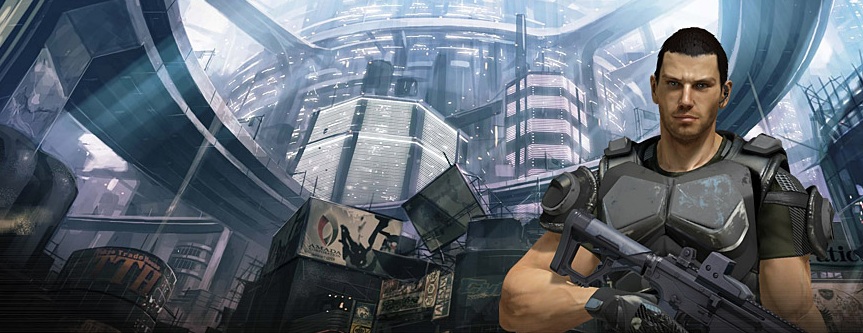
Welcome to the first of our Marked Down reviews – where we look at games which have been discounted and review them to see if they are worth your hard earned money. First up, tash takes a look at Binary Domain.
Binary Domain is Sega’s latest offering in the third person shooter arena, set in Tokyo in the year 2080. With a rather convoluted backstory, the game is the brainchild of Toshihiro Nagoshi, who is best known for creating the equally as involved Yakuza videogame series.
The backstory of Binary Domain is quite complex, but can be briefly summarised as follows: at some point in the future, global warming led to the rise of sea levels, inundating the majority of the world’s cities and killing millions upon millions of people. With three quarters of the world’s cities uninhabitable, governments built new cities above the waterlines, using robots as the main labour force. Robotic technology became the dominant industry, and research into creating robots that could pass as humans – called ‘hollow children’ began to be carried out in secret, in contravention to laws which banned this research. Special Task Forces called ‘Rust Crews’ were created to deal with breaches of the robotic-human research law. Binary Domain has you stepping into the shoes of a Sergeant of one of these crews, and tasks you with leading your squad in an investigation into the creation of hollow children by a foreign power.
This backstory is communicated reasonably well, and without relying on anything other than in-game information, you are able to follow the plot – if you’re paying close attention. There’s an abundance of cutscenes in the game which attempt to build an involved, in-depth narrative, but the game has a problem with connecting with the audience, and it struggles to create a conflict that you, as the player, care about. You never really get a sense of the scope of the conflict, but more importantly, you never really feel what impact the conflict has on you, and how you personally are affected by events.
The main enemies of the game are robots, the boss battles are more robots, and the steady stream of cardboard cutout robotic enemies results in you very quickly stepping into the ‘shoot everything, move on’ mindset very common for shooters. The fact that blood spurts are replaced with sparks and robotic parts detaching results in even less emotional connection to what you are doing. This is a game about robots, however, so I can’t critique gameplay featuring only robotic enemies. But I can say the reliance on such enemy types reduces your investment in and connection to your actions.
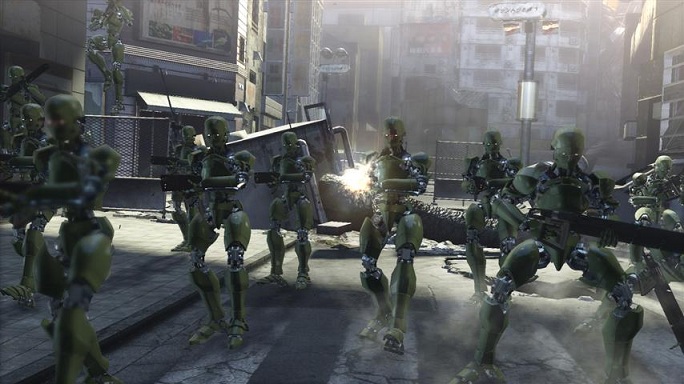
The storyline is quite engaging and you will want to continue playing to see how things unfold. Having said that, the game does struggle with connecting with the player, and it is not long before the ‘clear room, move forward, clear next room’ mentality rears its head. There were moments in the game where I was blazing through combat areas just to see the next cutscene and I’m not sure whether that is praise for the storyline being engaging, or criticism of the gameplay being uninspiring. Perhaps it’s a touch of both. Irrespective of the relatively ho-hum gameplay (which I’ll discuss later), the storyline is solid, and it does keep you invested in the game.
Dialogue in the game is hit and miss. There are times where the dialogue shines and moments of humor balanced with serious emotion, and yet there are also faceplam moments where characters deliver such stereotypical lines I’m not sure whether the game is taking itself seriously or not. For example, there is a black squadmate who uses the term ‘aight’ so regularly and with the same pronounciation it started to grate on my nerves. Other characters suffer from this in game, including the main character who shares a ‘hot damn check out this hot chick!!!!!!’ alpha male bro-fist moment with his male squadmate when the (potential) love interest is introduced. And by love interest, I mean ‘girl you can bang if you have high enough trust with’. Despite these cirticisms, the dialogue and storyline is, on the whole, well done and it is nice to see the game attempts to go beyond the usual ‘shoot baddies until you come to bigger baddies’ aspiration of most shooter titles. The plot woven around the combat areas isn’t going to win any literary awards, but it is neverthleless a solid attempt, and I appreciate the decision by the devs to include human elements into the story.
The soundtrack is servicable, and that’s about the only thing I can say about the score. It’s there, you hear it, but it never affects you on any deep level, and it’s hardly memorable. It doesn’t impact on the cutscenes or action sequences by being too loud or too oddly inappropriate for the scene, but it doesn’t stay with you either. If you’re looking for a stirring accompanyment to robotic-shooting-funtimes, look elsewhere. In comparison, the voice over work featured in game is very well done. Voice actors for each of the squadmates do an excellent job communicating emotion and feelings, and supporting characters are similarly well voiced. I was slightly worried going into this playthrough, but I needn’t have been concerned. The VO work here is spot on in most areas and whilst it isn’t up to the likes of Mass Effect or Uncharted 3, it is still a commendable effort.
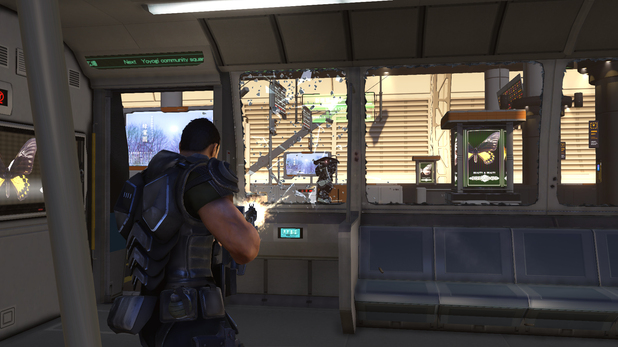
Graphics-wise, the game does well. There are a mix of locations and colours used, and I never experienced any issues with long load times, blurry areas or after-the-fact pop ins. Cutscenes were structured well and never suffered any odd character placements or illogical item incidents (yes, I have played games that have suffered this and characters have morphed into others’ bodies or a bottle they were drinking from has merged into their hand). The graphics were good without being spectacular, and there was an attempt made to incorporate varying locations and set pieces. With that said, there was an over-reliance on enclosed areas and areas where there was a clear linear path to the next objective. Being a shooter, I expect a fair degree of this, but the amount of indoor and/or underground areas did become grating after a while, and it is disappointing that so much of the game occurred in very contained, straight forward, linear environments. The game’s plot explains the reasons the action is set in these locations, but the continual use of similarly styled areas results in a monotonous feel to the game that is hard to shake. In some areas, it is a slog to get through fights, and the lack of uniquely different locations is partly to blame.
The remainder of the blame for the hard slog fight areas is due to the title’s hit and miss gameplay. Some parts of the gameplay mechanics work well, and others fail miserably. One of the unique elements of the game is that it utilises voice commands to give squadmates directives during combat. When your squad engages with an enemy group, you have the option to issue commands to them via your microphone headset – these commands are simple directions like Fire! or Hold! or Regroup! Similarly, during combat your squadmates may make suggestions for fighting approaches, which you can respond to using your headset. Voice commands are also included in normal squadmate conversations outside of combat, where you are conversing with your squadmates one-on-one, and have a list of response options to their questions. When I first realised I would need to use my microphone and shout orders to my squadmates at my television – I found it awkward. This kind of gameplay is not something I, as a predominantly single-player gamer, is experienced with, or used to. I found it an odd, awkward, and if I’m being honest, rather embarassing experience. The game does provide the option to turn off voice commands and use only the face buttons to direct and speak with your squad. But it also cautions that doing this will reduce your ability to effectively command your team-mates. As a result of this caution, I decided to continue using the voice commands despite feeling highly embarassed and awkard doing so.
Eventually, however, the struggle with the commands proved too great and I switched to the face button control scheme of issuing commands. The reason for this? The voice recognition was simply too inaccurate for me. Despite only having a limited amount of recognised words you can use, I found the voice recognition would confuse words I was speaking with completely different instructions. There were numerous occasions when I said ‘Roger’ and somehow the game thought I said ‘Wait’ or ‘No’. Alternatively, there were times when I had to shout the word command I wanted five times before the game registered I had said it, making an already awkward mechanic feel even more so. I turned off the voice directed mechanic around one third of the way into the game, and found utilising the face buttons to give squadmate orders much easier and more effective.
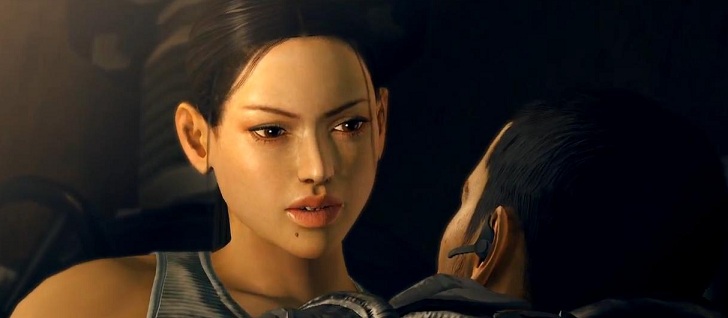
One of the other major issues with the inaccuracy of the voice commands within Binary Domain is the fact that your responses to squadmate interactions affect the ‘Consequence System‘ – which measures how much trust you have built up with each squadmate. Numerous actions affect this system – performing well in combat; giving successful and well thought out commands to your squadmates; and choosing the correct responses to their questions. Do well in these aspects and the trust you have with your squadmates will increase. When your squadmates have high trust in you, they are more likely to follow your orders, including orders which seem like suicide mission instructions. If you manage to raise your trust high enough with particular squadmates, you will unlock certain cutscenes, and some plot-specific moments can be altered based on the level of trust you have with specific squadmates. It’s a very interesting, unique way to manage relationships with your team-mates, and I applaud its inclusion into the game. However, its implemetation is hit and miss, and given the trust system is linked to the voice commands and gameplay elements, when these two systems falter they bring the trust system down with them. Selecting responses team-mates dislike decreases their trust in you, and given the alarming frequency this game has with mis-attributing what you say through your headphones, this becomes irritating very fast. As I mentioned earlier, I stopped using my headphones and began selecting answers manually simply to stop losing trust with my squadmates.
Squadmate trust is also lost everytime your squadmates are hit with friendly fire. Logically, this is understandable, since you aren’t going to think too highly of someone who fires on you. Unfortunately, your squadmates have the very irritating and unfortunate habit of running into your line of sight, and even if they are the ones to run straight through your cross-hairs, you still lose trust with them if you inadvertently shoot them. And not only that – you lose a significant amount of trust with them. The squadmate AI’s eagerness to run into your line of fire is extremely infuriating, maddening and every other negative descriptor you can think of. As a result it hurts the game itself, because your enjoyment of playing through it decreases. As a perfectionist, I found myself having to restart checkpoints after squadmates ran into my line of fire, I subsequently shot them, and then lost trust with them. Given the fact that the game doesn’t allow you to manually save and instead employs a checkpoint system, its extremely frustrating to have to replay a difficult segment simply because the squadmate AI is problematic.
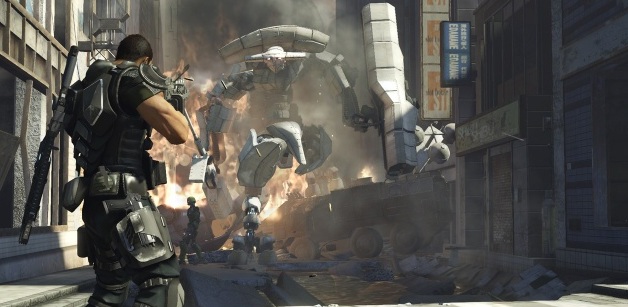
The core gameplay itself follows the formula of pretty much all the games in the genre: enter an area, clear it of all enemies, move on to the next area to repeat the process. Added to the mix are boss battles, which serve as demarkations for chapters. Because the plot of the game sees you fighting robotic foes, there really is no variability to the enemies you face – they are all robotic in some way, with the boss battles featuring different types of massive robotic animals – from spiders to gorillas. They’re impressive fights, but in the end they’re all just large robotic animals and they all boil down to the same objective: avoid the boss battle animal’s special attacks long enough to inflict enough damage to defeat it. The repetition with which this occurs is disappointing and makes the game feel cheap. The fights themselves are challenging and do require strategic thinking, but the game relies on them too much and after the third fight you’ll be over them. There’s only too much ‘shoot at the exposed glowing area’ gameplay you can take before it becomes annoying.
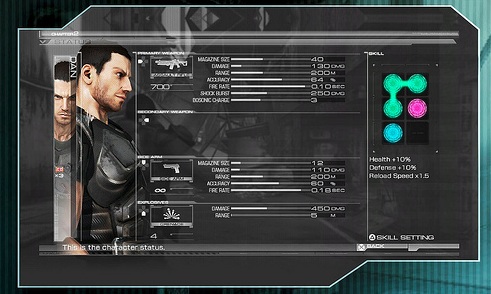
The weapons you have access to in the game perform solidly and I couldn’t fault their feel or implementation. There’s a range of weapons you can equip, and you are able to carry several types of weapons at once, in addition to equipping grenades and other similarly thrown weapons. Your primary weapon and the primary weapon favoured by each of your squadmates can be customized, and I found this a neat addition to the game. For every impressive thing you do in the game – shooting multiple points on enemies; performing headshots etc – you are rewarded with CR – which can be used to buy items and upgrade weapons. You can buy everything from extra weapons to ammo, grenades, medpacks and nano’s. Nano’s are basically the game’s buffs and when equipped they offer bonuses to health, defence, regeneration speed and more. You’re able to buy nano’s for yourself and your squadmates, and the variety of different nano’s compliments different playstyles. The fact that you can swap out and change nano combinations at will whenever you come across a shop in-game is definitely a strength of the gameplay, and I appreciated the ability to change my buffs at will without any negative consequences. The way the nano system is implemented is a credit to the game – it makes sense in the larger narrative and it works – if all gameplay elements worked as well as and were implemented as effectively as this was – Binary Domain would have scored higher. On the whole however, the other gameplay elements which simply don’t work detract from the otherwise solid weapons and buff system.
All things considered, Binary Domain is an interesting fusion of shooter and RPG that shines in the RPG elements but is let down by the shooter focus. I must commend the developers for attempting something different, and for trying to include unique gameplay elements, but the implementation falls short and leads to frustration on behalf of the player. The gameplay is repetitive, boss battles are used too often, and despite some stellar use of weapons upgrade and buff style systems, overall the gameplay falls down. The game itself looks good, it doesn’t suffer overly much with slowdown or framerate issues and the voice over work is a credit to those involved. However, the soundtrack is average, the locations uninspired, and the repetitiveness of the enemy types dampens the enjoyment of the game. Whilst the plotline and dialogue will keep you interested and pushing through to see what happens, the hit and miss gameplay elements and frustrating squadmate AI will mean your first playthrough will likely be your last. A shame, given the weapons, nano and squadmate systems encourage different playthroughs using different weapon and nano combinations.
Is Binary Domain worth buying? At a marked down price of around $20, yes it is. At full price, there are better games out there.
Binary Domain scores 7/10.
Binary Domain is currently available at these marked down prices:
Australia – AusGamez – $21.36
UK – Zavvi – £9.95
USA – Amazon.com – $38.68



